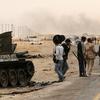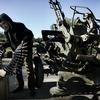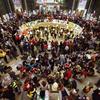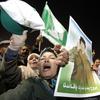Jillian Weinberger appears in the following:
How Middle East Revolutionaries Would View a Shutdown
Friday, April 08, 2011
Nicholas Kristof, columnist for The New York Times and Mina al Oraibi, Washington D.C. Bureau Chief for the Arab-language newspaper Asharq al Awsat talk about the view of the U.S. government shutdown from the Arab world. As revolutions have spread throughout the Middle East this year, American politicians have had a lot to say about the importance of democracy in the region. But today, as the U.S. government teeters on the brink of a shutdown, do these words ring hollow to Arab revolutionaries? What would a shutdown look like to the countries fighting for democracy in the Middle East?
Census Reveals Major Demographic Shifts for US Children
Thursday, April 07, 2011
New data from the 2010 Census has revealed surprising facts about America’s children. Between 2000 and 2010, the number of Hispanic and Asian children in the U.S. grew by 5.5 million, while the population of white children declined by 4.3 million. How have our nation's schools handled these population shifts — particularly as states slash their education budgets? How will these demographic changes affect the U.S. in the future?
Response to Quran Burning in Florida: Protest and Dozens Dead in Afghanistan
Monday, April 04, 2011
The burning of a Quran at a Florida church has set off a wave of violence in Afghanistan. Thousands of protesters mobbed the United Nations building in Mazar-i-Sharif on Friday. Seven U.N. workers were murdered, and protests against the United States raged in Kandahar over the weekend, killing dozens. President Obama and General David Petraeus condemned the Florida pastor’s actions. Including the U.N. workers, 24 people have died since protests began last Friday.
Japan's Tragedy May Transform a Generation of New Workers
Friday, April 01, 2011
April 1st is the traditional "entrance day" for classes of new employees in Japan. It's a time when hundreds of thousands of recent college graduates would have just finished their first day at work, a day full of official ceremonies and welcome parties. However, as the country struggles to cope with multiple recent crises, Japan's newest workers face an uncertain future.
The CIA's Covert Operation in Libya
Thursday, March 31, 2011
When the United Nations voted to institute a no-fly zone over Libya, President Obama emphasized that the United States would not deploy ground troops in the conflict. But while there may not be American armed forces on the ground, The New York Times has learned that Central Intelligence Agency officials have been working in Libya for weeks, in an operation unknown to the American public — until now.
Is a Federal Budget Deal on the Horizon?
Thursday, March 31, 2011
Today, as the Tea Party Patriots rally outside the Capitol Building, lawmakers might actually be close to a compromise on the federal budget. Members of the Senate Appropriations Committee met with their House counterparts last night to see if they could strike a deal to avoid a government shutdown. But the compromise in question would include $33 billion in cuts — $28 billion less than the budget Republicans passed in the House. How will the Tea Party react to a deal with Democrats? What are the implications for Speaker of the House John Boehner?
Learning from the Past: US Military Conflicts
Monday, March 21, 2011
Although the role of the United States in Libya differs from its role in Iraq and Afghanistan, the intervention does resemble many other modern conflicts. Think back to the Gulf War and the Balkan wars throughout the 1990s. What can we learn from America's diplomatic and military strategy during those conflicts that might be relevant for our intervention in Libya? Joining us to analyze the position of the U.S. in Libya is Leslie Gelb, President Emeritus of the Council on Foreign Relations.
Congress Reacts: US Military Intervention in Libya
Monday, March 21, 2011
Over the last few days, the U.S. moved very quickly from a U.N. resolution authorizing military intervention in Libya to missiles and bombs actually striking the country. In many ways, members of Congress are still catching up with the news from the White House and they have been reacting both with support and anger. Who's in charge of the no-fly zone: Britain, France or the U.S.? Who exactly are the Libyan rebels we're supporting? And why didn't President Obama consult Congress before authorizing military intervention?
Gauging US Military Strategy in Libya
Monday, March 21, 2011
U.S. and European allies attacked Col. Moammar Gadhafi's forces by air and sea throughout the weekend. The allies also instituted a no-fly zone over Libya, allowing rebel forces to strengthen their hold on the eastern city of Benghazi. But the long-term implications of American military intervention are unclear. Although the Obama administration has called for Gadhafi’s ouster, the U.N. Resolution that authorized intervention did not. And the U.S. is already fighting two wars. How long will the conflict in Libya last?
Court Vacancies Force Judges From Retirement
Friday, March 18, 2011
There are 95 vacancies in the federal courts, forcing semi-retired senior judges to pick up the slack — a lot of it. Arizona judges are under particular duress; their courts have such a back load, they can’t meet the Speedy Trial Act, a law that requires courts to try criminal defendants within 70 days after they are charged. Caseloads in most federal courts continue to increase while the number of active judges shrinks — and yet 45 judicial nominees are languishing in the Senate. Why hasn't the Senate confirmed these nominees?
Relief Efforts in Japan Underway as Survivors Battle Hunger, Homelessness
Friday, March 18, 2011
It’s been a week since the earthquake and tsunami devastated Northern Japan. So far, the disaster has claimed nearly 5,700 lives and 9,500 people are still missing. As relief organizations try to clear away the rubble, there’s yet another crisis hitting the country: hunger. Severely damaged roads and broken supply lines have caused food shortages throughout the region.
Faceless 50: When Workers Face Extraordinary Responsibilities
Thursday, March 17, 2011
The world’s eyes are on the "Faceless 50" workers at Fukushima Daiichi Nuclear Power Station as they struggle to keep potential radiation leaks under control. Though the workers' identities are unknown, their incredibly stressful task has captured our imaginations. The United States also has people working in fields where the willingness to risk your life in a catastrophe is part of the deal. Is it worth it? And who gets left behind to fight the good fight?
US Business Reacts to Japan
Wednesday, March 16, 2011
The crisis in Japan has finally hit home for stock markets around the world. Investors are concerned that electronics manufacturers, who import chips from Japan could be affected by lapses in the supply chain. Two of Japan's top companies, Honda and Toyota have halted production at their Japanese plants and Detroit is highly dependent on parts from Japan. At the same time, the disaster in Japan has raised questions about the energy industry here in the United States.
'Then Everything Changed': Big Moments in American History
Thursday, March 10, 2011
Historians usually stick to facts, but sometimes it’s fun to play the "what if" game with history. What if president-elect John F. Kennedy had been assassinated in December 1960? What if Robert Kennedy had lived through Sirhan Sirhan's attempt on his life and became president in 1968? What if Gerald Ford had corrected a misstep in the 1976 presidential debate with Jimmy Carter and won a second term?
'Aerotropolis': The City of the Future?
Tuesday, March 08, 2011
In the 2009 movie "Up in the Air" Ryan Bingham, played by George Clooney, tells viewers that "all the things you probably hate about traveling are warm reminders that I am home." Bingham and his colleagues built their lives around air travel. "Aerotropolis: The Way We'll Live Next," argues that the cities of the future must do the same.
What's Next for Libya?
Thursday, March 03, 2011
Rebel forces continue to fight for freedom from the Gadhafi regime. They have taken over much of the eastern part of the country, but experts say that Gadhafi will likely retain his hold on the capital city of Tripoli. Complicating the current and future situation in Libya is the fact that it's a tribal country, with some factions supporting Gadhafi and others fighting with the opposition.
NFL Union Battles and the Future of Football
Thursday, March 03, 2011
The NFL management has accused its players of deliberately trying to decertify their own union. If no action is taken, the National Football League Players Association will be decertified at midnight tonight. Why would NFL players want to do this? To be able to sue. Unions are barred from filing anti-trust lawsuits against the league, but individual players would have this right without the unions and can make more money. However, players stand to lose benefits and a say in how the league is run.
Charlie Sheen and AA: A Psychologist's Take
Wednesday, March 02, 2011
Actor Charlie Sheen has publicly denounced Alcoholics Anonymous a number of times over the past few weeks. He has also claimed that he "cured" himself of alcoholism "with his mind." Charlie Sheen is only one celebrity, only one dissenting voice among a chorus of professionals who believe in AA. But, thanks to a number of recent, highly-publicized interviews, some psychologists are concerned that Sheen’s comments about AA and alcoholism might affect the way their patients think of the twelve step program and the disease.
Social Studies Lessons from the Wisconsin Budget Battle
Wednesday, March 02, 2011
The battle between Wisconsin Governor Scott Walker and public unions continues. Tuessday, Governor Walker introduced his two-year budget proposal, which includes nearly $900 million in public school cuts. Walker unveiled his budget just weeks after he announced his controversial proposal to strip the state's public unions of collective bargaining rights. Wisconsin teachers are at the forefront of this fight. But how do teachers discuss the budget battle once they return to their classrooms?
Updates from Bahrain and Libya
Monday, February 21, 2011
Protests continued to rage across the Middle East throughout the weekend. While the Bahraini government withdrew its military from the capital and allowed peaceful demonstrations, Libyan security forces continued to fire on protestors in Benghazi and Tripoli. Human Rights Watch estimates that the Libyan government has killed at least 223 protesters since political unrest began six days ago. But in a nationally-televised address, the son of Libyan ruler Col. Moammar Gadhafi, Seif al-Islam al-Gadhafi, claimed that the death toll was greatly exaggerated and that Libya was on the brink of civil war. Will Gadhafi hold onto power? What's next for Bahrain? And how will the Obama Administration respond?

















